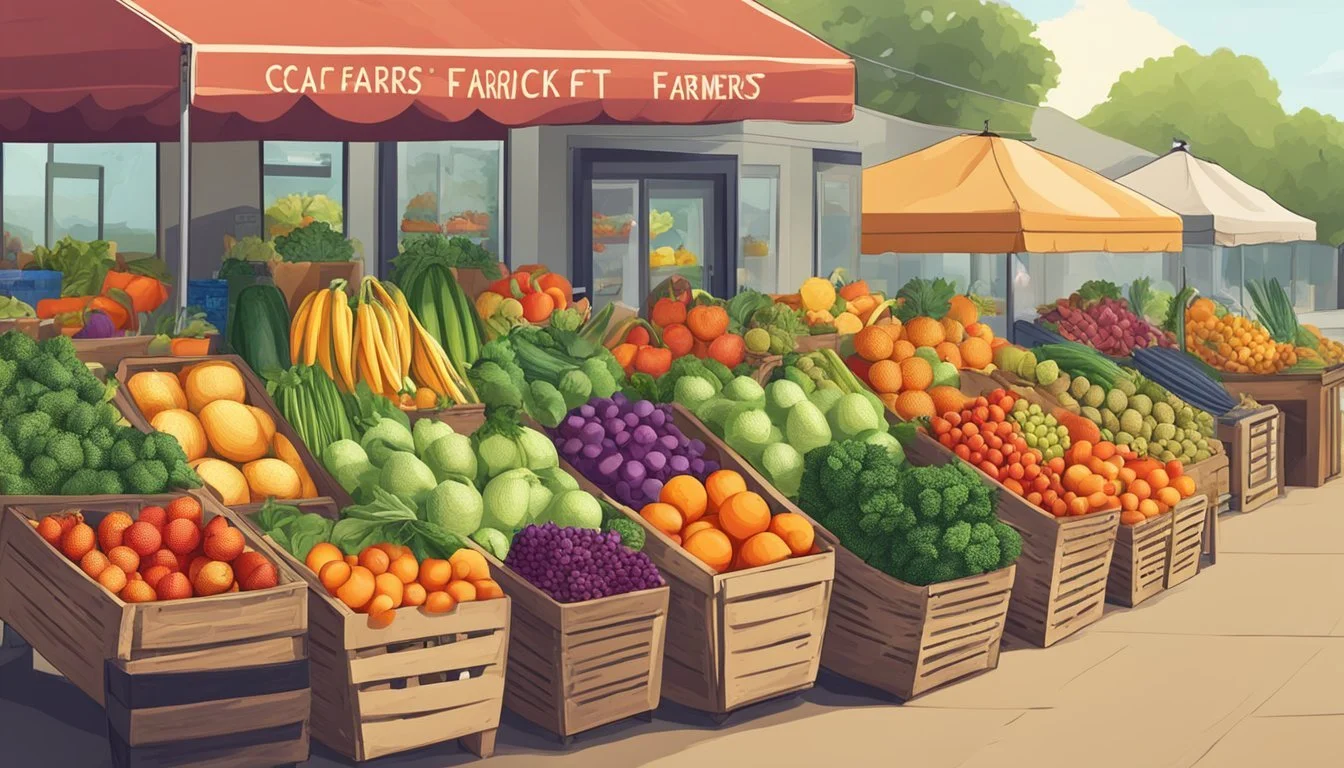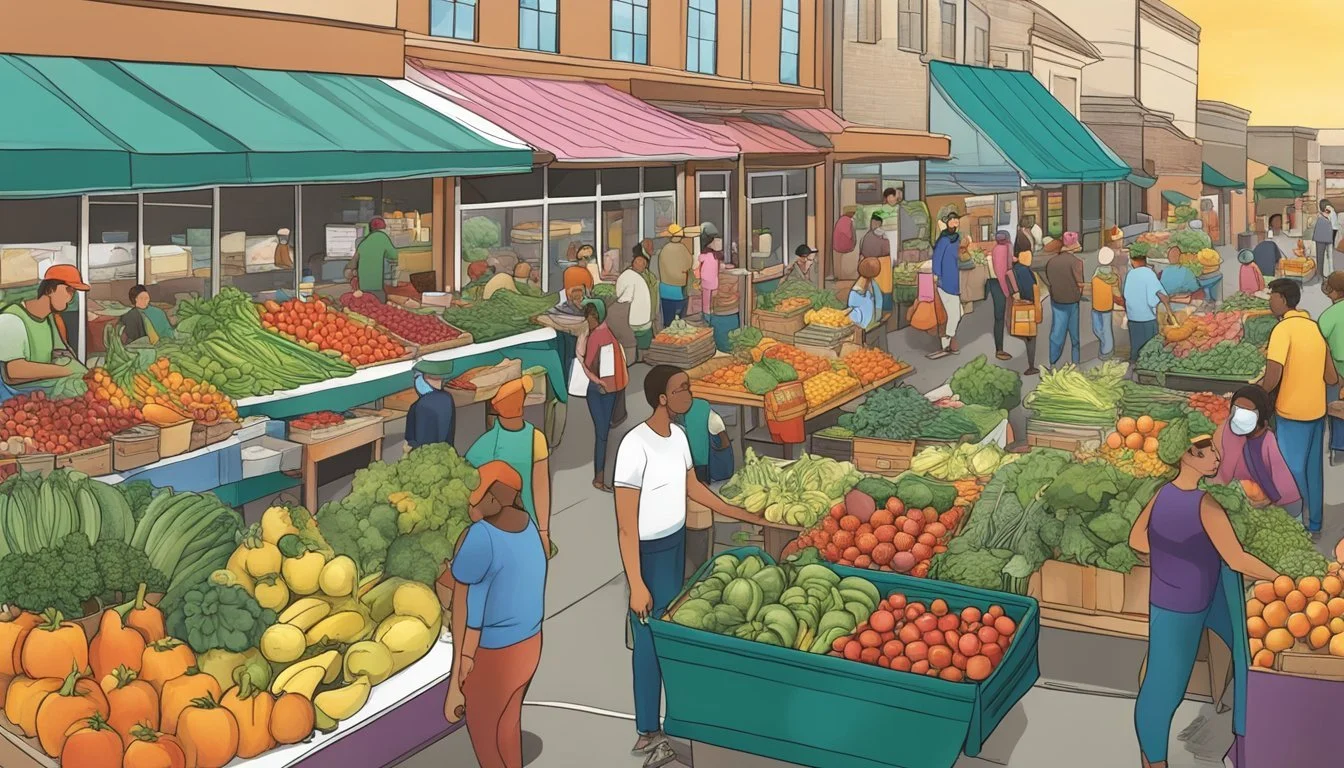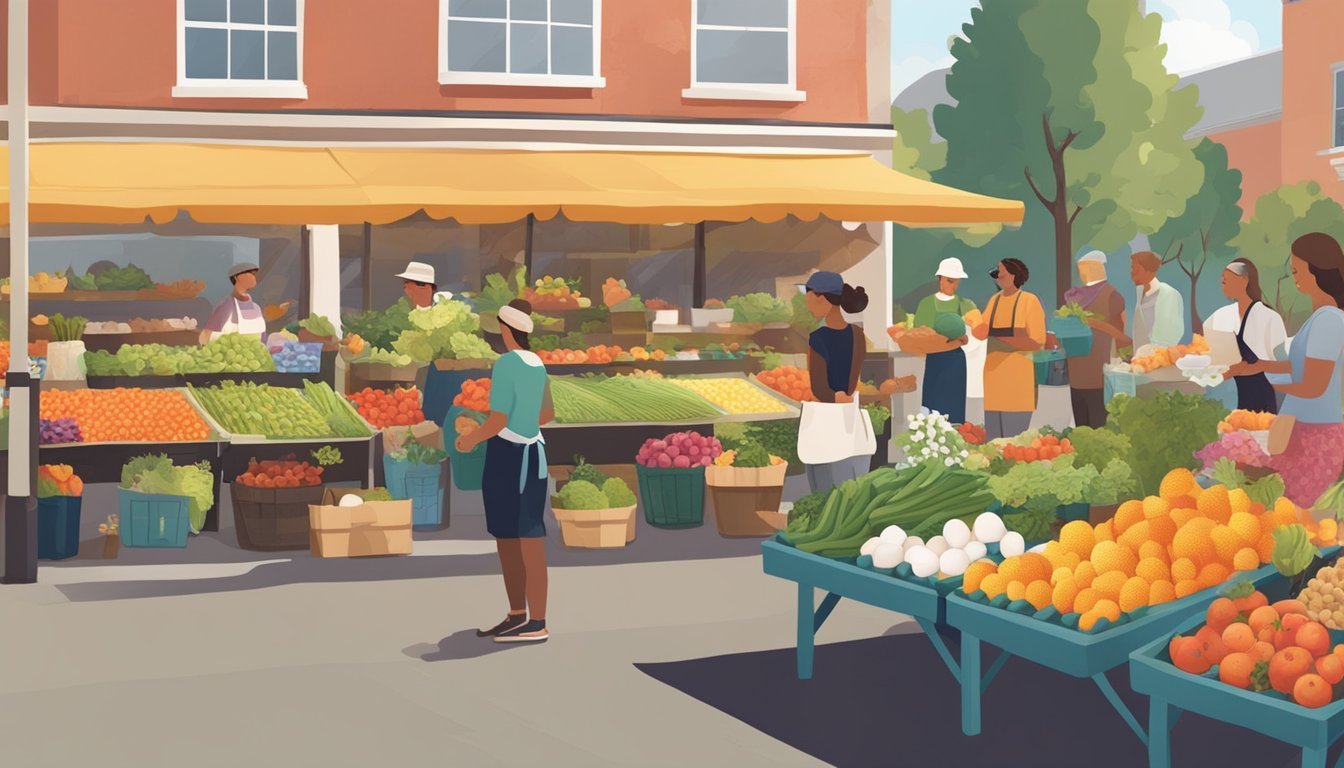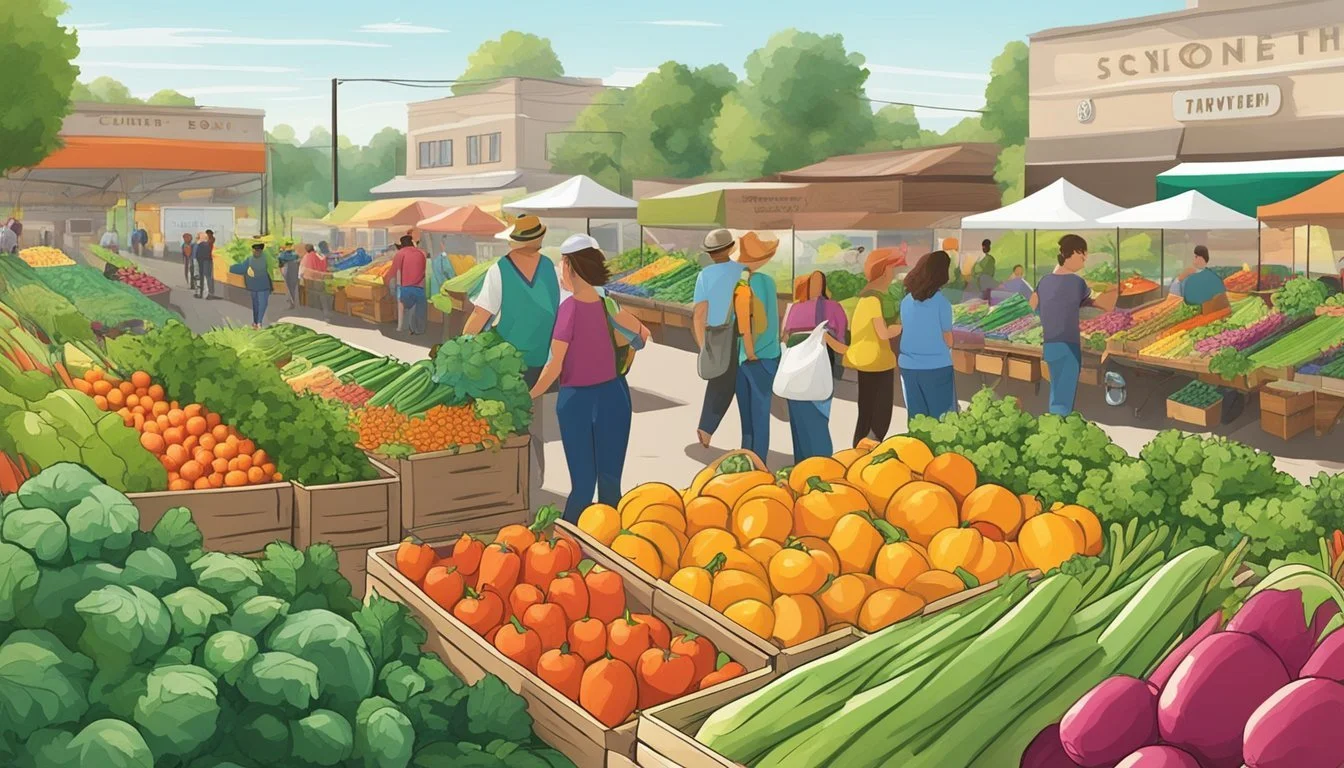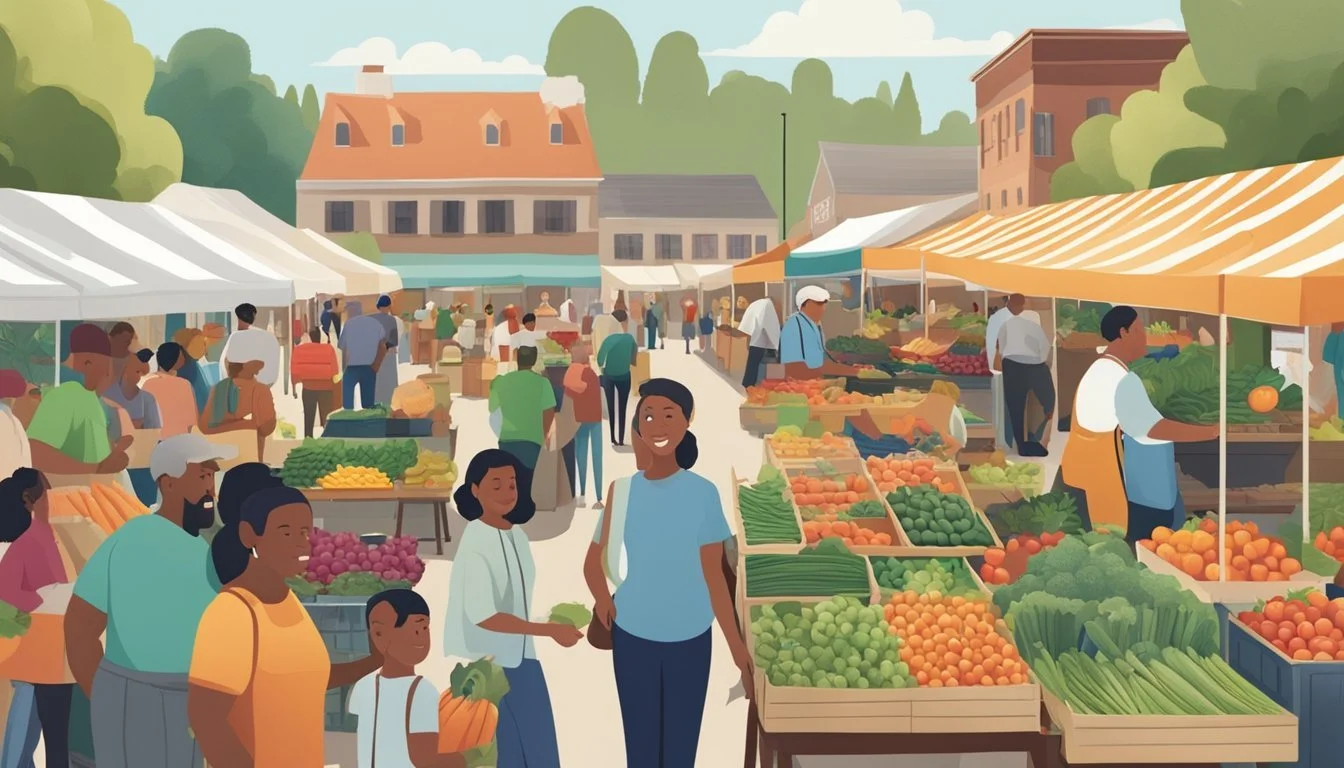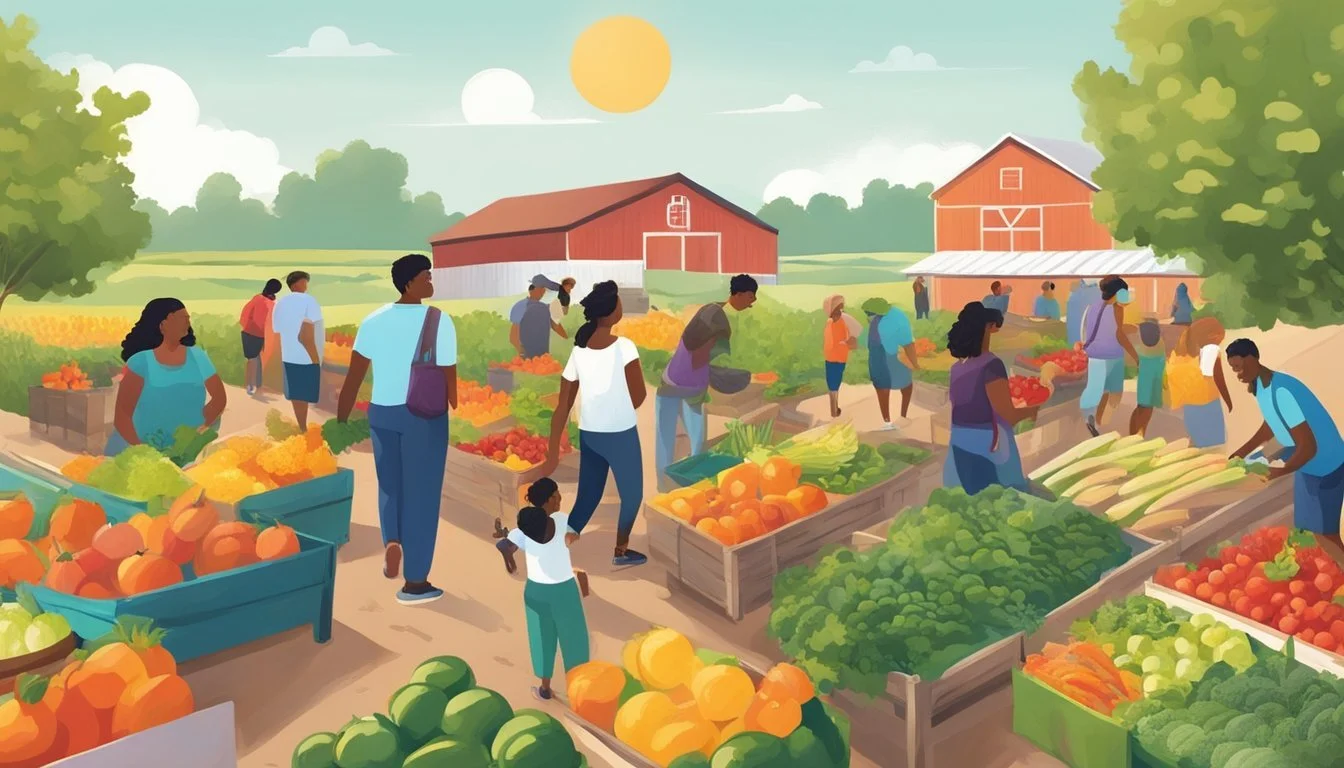Community Supported Agriculture (CSA) in Irving, TX
A Guide to Local Produce Subscriptions
Community Supported Agriculture, commonly referred to as CSA, is a farming model that has taken root in Irving, TX, alongside many other localities. In this system, consumers purchase shares of a farm's anticipated harvest, which creates a structured partnership between local farmers and community members. These shares typically consist of a diverse assortment of seasonal produce and, in some cases, additional farm products.
In Irving, a growing number of individuals are choosing to engage with local agriculture through CSAs. This approach supports farmers by providing them with upfront capital, mitigates the risk of farming, and fosters a stronger connection between residents and the source of their food. Consumers benefit from fresh, in-season fruits and vegetables while investing in their local economy and promoting sustainable farming practices.
The CSA model in Irving reflects a wider movement in Texas, where residents value knowing where their food comes from and prioritizing the health of their families and the environment. Each CSA operates uniquely, tailoring their share offerings and pickup procedures to best fit the needs of their members and the capabilities of the farm. Despite some differences, the core idea throughout CSAs in Irving remains consistent: a shared commitment to community well-being and support for local agriculture.
Understanding CSA
Community Supported Agriculture (CSA) has reshaped the relationship between farmers and the community in Irving, TX. This section covers the essence of CSA, its historical roots and core principles, and the variety of models practiced in the local context.
What is CSA?
CSA stands for Community Supported Agriculture, a model wherein community members purchase subscriptions—or shares—from local farms. In exchange, members receive regular distributions of the farm's products throughout the farming season. This model emphasizes a shared commitment where the community supports the farmers, and the farmers, in turn, provide fresh, locally grown products to the members.
History and Principles
The CSA model originated in the 1960s in Japan and made its way to the United States in the mid-1980s. Its underlying principles are centered around community involvement, sustainability, and a strong farmer-to-consumer relationship. By pre-purchasing shares, members share the risks and benefits of farming with the producers. Texas saw its first CSA in 1994, underlining the model's expansion and adaptability to different regions.
CSA Models
There are various CSA models, each catering to different needs and preferences of both the members and the farms. Common features of CSA models include:
Traditional or "Farmer's Choice" CSA: Farmers provide a variety of their best weekly produce selections to members.
Market-Style CSA: Members choose their produce from a more traditional market setup, using their subscription as a form of currency.
CSA Farm Box: A pre-packaged box of produce is prepared for pickup or delivery at regular intervals.
Irving, TX, features such models, demonstrating the versatility and innovation within the CSA framework, catering to a diverse community while embracing local agriculture.
Benefits of CSA
Engaging in Community Supported Agriculture (CSA) programs offers tangible advantages to consumers, provides financial stability to farmers, and fosters a more sustainable agricultural model that positively influences the environment.
For Consumers
Accessibility to Fresh Produce: CSA members enjoy the luxury of obtaining farm-fresh produce regularly. This direct relationship with the farm ensures they receive nutrient-rich, seasonal produce shortly after harvest, which is often richer in flavor and nutrients compared to items found at traditional grocery stores.
Transparency: Consumers have a clear understanding of where their food comes from, fostering trust through transparency.
Economic Savings: Buying shares of a farm's produce upfront can be cost-effective over the season.
For Farmers
Assured Income: Farmers benefit from CSA models as they receive payment early in the season, which aids in planning and covers upfront costs such as seeds and equipment.
Market Stability: By selling directly to consumers, farmers not only bypass intermediaries but also build a loyal customer base, providing a more predictable market for their products.
Environmental Impact
Reduction in Carbon Footprint: Local distribution of food contributes to a reduction in carbon emissions because of decreased transportation distances.
Promotion of Sustainable Practices: CSA encourages sustainable agriculture, as the demand for local and seasonal produce supports farming methods that are less taxing on the environment compared to large-scale industrial farming.
CSA Operations
Community Supported Agriculture in Irving, TX operates through a collaborative relationship between local farms and members who receive a portion of the harvest. The operations are structured to maximize the benefits of locally-grown produce through effective farming practices, strategic distribution, and efficient membership management.
Farming and Production
Local CSAs employ sustainable farming techniques to grow a variety of vegetables and fruits, ensuring a bountiful, seasonal yield. Farms like Yahweh's All Natural Farm prioritize organic methods, enhancing soil fertility and biodiversity. They often extend beyond produce, providing meat, eggs, and other farm products as part of their offerings. CSA farms focus on the community's needs, planning crop rotations to provide fresh, diverse weekly harvest baskets.
Distribution and Logistics
The distribution system is integral to CSA operations in Irving. Each week, farms package the harvest into shares—often referred to as farm boxes. These shares are then distributed to members or designated pickup locations. Logistics are carefully managed to maintain the freshness of the produce, with CSAs coordinating timely deliveries to ensure members receive their produce at peak freshness.
Membership Management
Managing memberships is a cornerstone of CSA operations. Farms manage relationships with customers through regular communication, often utilizing digital platforms for updates and notifications about their latest offerings. Members typically commit to a season or year, fostering a strong community-supported model. This commitment allows farmers to effectively plan and distribute resources, ensuring the longevity and sustainability of the CSA.
Members partake in the risk and bounty of farming, which often strengthens the relationship between the consumer and the farm, highlighting the reliance on and trust in local food systems.
Local CSA Farms and Offerings
Community Supported Agriculture in Irving, Texas, highlights the symbiosis between residents and local farms, providing a variety of seasonal produce and other farm products. The focus on high-quality, local organic produce ensures that members receive the freshest fruits and vegetables, while also supporting sustainable farming practices in the Dallas-Fort Worth area.
Types of Products Offered
CSA farms around Irving offer an array of products which generally include:
Fruits & Vegetables: A diverse selection ranging from tomatoes to seasonal greens.
Meat: Options such as pastured chicken that are often antibiotic and hormone-free.
Additional Farm Products: Some CSAs provide eggs, dairy products from goats or cows, and even artisanal goods.
The use of natural farming methods often means that the selection of produce is seasonal and picked at the peak of ripeness, enhancing flavor and nutritional value.
Profile of Local CSA Farms
East Texas Homestead Farms: Located in Mineola, not far from Irving, it's one of the first farms in East Texas to adopt the CSA model. Although their vegetable subscriptions are currently full, it reflects the high demand for local, community-focused farming.
Candy Girls Chick and Livestock: A notable farm near Irving, which champions the construction of local food systems. While their CSA information may not be current, direct contact is encouraged to inquire about their offerings.
Farms in the region vary in size and scope, but they all share a commitment to providing the local community with fresh, seasonal, and high-quality produce and products.
Choosing a CSA in Irving
When selecting a CSA in Irving, consider:
Product Assortment: Does the CSA provide the variety of products you're interested in?
Pick-up/Delivery Options: Can you conveniently obtain your share?
Subscription Flexibility: Are there different subscription plans that meet your household's needs?
Farm Practices: Are their farming methods in alignment with your values, prioritizing sustainable and ethical practices?
CSA members typically commit to a season of produce, fostering a tangible connection to their food's source and contributing to the resilience of local agriculture.
Beyond the Box
Within the CSA model in Irving, TX, the concept of "Beyond the Box" represents the extension of CSA benefits to include educational and community-building opportunities. These offerings enhance the understanding and skills in agriculture, provide enrichment through local events, and foster sustainable practices.
Educational Opportunities
CSA programs in the Irving area are not simply about food distribution—they're also a potential hub for learning. Classes and workshops on sustainable farming, urban homesteading, foraging plants, and the use of useful plants and weeds are often available for those interested in deepening their agricultural knowledge. For instance, a micro-farm in Hutchins, Texas, could serve as a learning project, offering hands-on experience in food production education and jobs, where attendees come to understand the production of nutritious food from seed to table.
Community Events and Workshops
Participants in CSA's in Irving can anticipate a number of community events and workshops throughout the year. These gatherings might feature functional crafts that utilize local flora, creating a direct line between the land and everyday life. Sessions on how to make fermented products with EM-1 and lactic acid bacteria could be organized, illustrating the balance between earth care and product utility. Such events foster community and serve as a backbone for networking between like-minded individuals focused on healthy, sustainable living.
Permaculture and Sustainability Practices
The adoption of permaculture principles has been a key feature for several CSAs in Irving, with emphasis on earth care and sustainable farming techniques. For example, Lorica Tea and Botanicals might educate on the integration of perennial growing methods to maintain a healthy soil lab, while a local nursery could provide insight into the selection of native plants that thrive in the Texan climate, minimizing the need for external inputs. Regular discussions and training on how to manage compost and manures effectively to promote soil health are also likely to be a cornerstone of CSA programs dedicated to sustainability practices, reflecting a commitment to education that goes well beyond the contents of the weekly food box.
Impact on the Community
Community Supported Agriculture (CSA) in Irving, TX creates a significant impact on the local community by strengthening the bond between residents and local farmers, bolstering food security, enhancing the local economy, and raising awareness about sustainable practices. These initiatives support the community's journey towards a more resilient local food system.
Building Relationships with Local Farmers
CSA programs in Irving allow community members to form direct relationships with local farmers. Membership in a CSA leads to personal interactions through community events that foster a sense of connection. These relationships are not just transactional; they help community members understand the challenges and rewards of local agriculture.
Key Benefits:
Stronger Ties: Enhanced trust and support between community and farmers.
Shared Values: Commitment to "eat local" and uphold sustainable practices.
Food Security and Local Economy
The local economy in Irving benefits from the circulation of funds within the community through CSAs. By investing in a share of the harvest, shareholders essentially vote with their dollars for a robust local food system that contributes to greater food security.
Economic Contributions:
Direct Sales: Dollars spent on CSA shares remain in the local community.
Job Creation: Support for local farms can lead to more employment opportunities in agriculture.
Education and Awareness
CSAs in Irving serve as educational platforms that raise awareness about urban homesteading, sustainable agriculture, and nutrition. These programs often involve activities designed to inform members about where and how their food is produced.
Informative Interactions:
Farm Visits: Opportunities to visit local farms and learn about the farming process.
Workshops: Sessions on sustainability, agriculture, and the importance of local food systems.
Choosing and Using CSA
When opting for a CSA, consumers in Irving, TX, embark on a local and flavorful food journey, directly supporting Texas farmers and enjoying bountiful produce. Understanding selection, utilization, and communication strategies ensures a fulfilling CSA experience.
How to Select the Right CSA
Local Relevance: Potential CSA subscribers should seek farms within a reasonable distance from Irving to guarantee the freshness of their produce. This proximity can also facilitate easier pickups or deliveries.
Seasonality and Variety: Consider the types of produce offered throughout the seasons. Many CSAs provide comprehensive lists of what they typically grow, including expected yields. Choosing a CSA that rotates crops and offers a wide array of produce ensures a diverse diet.
Subscription Details: Examine the structure of subscription options, such as full or half shares, to determine the appropriate quantity for personal needs.
Making the Most of Your Share
Cooking and Preservation: Upon receipt of a CSA share, it's important to have plans for both immediate usage and longer-term storage to prevent waste.
Integrating CSA into Meal Plans: Utilize CSA vegetables and fruits in weekly cooking by starting with the fresh ingredients as the basis for recipes.
Preservation Tips: Learn methods such as canning, freezing, or dehydrating to preserve excess produce, especially when the yield is abundant.
Feedback and Communication
Constructive Feedback: Subscribers should not hesitate to provide farmers with feedback on their shares. This communication can range from the quality and variety of the produce to the cleanliness and packaging.
Continuous Dialogue: Engage with the CSA provider through methods they prefer, whether it's email, social media, or face-to-face at farmers markets. This relationship fosters a better understanding of the subscribers' needs and farmers' challenges.
Community Engagement: Participate in any offered CSA community events or forums. These gatherings are valuable opportunities for sharing tips, recipes, and experiences with fellow CSA members.
The Future of CSA
Community Supported Agriculture (CSA) in Irving, TX is adapting to new consumer trends while grappling with various challenges. Innovations and strategic partnerships are fostering expansion and diversity within CSA models.
Trends and Innovations
CSAs are experiencing a shift towards incorporating tech-savvy marketing strategies and broader product offerings. Marketing innovations, such as social media usage and online sales platforms, enable CSAs to reach a wider audience while fostering direct relationships with consumers. The advent of subscription-based applications has simplified the CSA membership experience. Farms are increasingly diversifying their shares with not just seasonal veggies but also artisanal foods, grains, and other farm products, extending the growing season and enhancing the appeal of CSA programs.
Challenges and Potential Solutions
Despite the potential, CSAs face challenges such as fluctuating membership rates and competition from large-scale retailers. Balancing sustainable practices with financial stability remains a key issue. However, potential solutions lie in collaborative events with local businesses and educational initiatives that underscore the benefits of seasonal food consumption. CSA growth can be further amplified by government incentives supporting both the farms and local members joining these programs across the United States.
Expansion and Diversity
An increase in ethnically diverse crops and inclusive community outreach programs is characteristic of today's CSAs. Expansion is not only regional but also demographic, attracting a variety of member households. This shift is mirrored in an expanded product range, from heritage veggie varieties to specialty grains, catering to a broader palette and dietary preferences. The promotion of CSAs in schools and workplaces is another key route for expansion, capitalizing on the growing interest in local and sustainable food systems.


